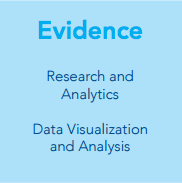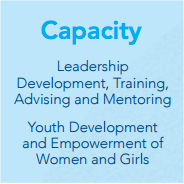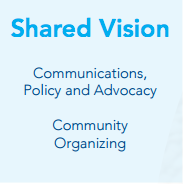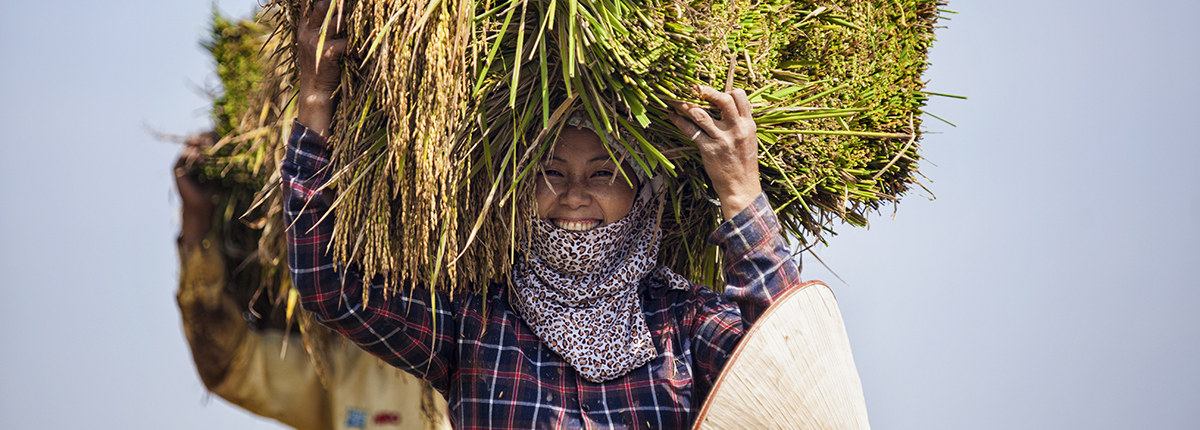
Resilient Agriculture
COMPLEX PROBLEM: Climate change is already making it harder for people to feed themselves. From 2003 to 2013, climate-related economic losses stemming from decreased crop and livestock production exceeded $80 billion. The problem is especially severe in sub-Saharan Africa, where 95 percent of the food grown depends on rain. The World Bank anticipates that by 2030, climate-related impacts on agriculture will push an additional 100 million people into poverty.
INTEGRATED SOLUTION: Winrock’s approach to making agriculture more resilient to climate change has three focus areas: 1) improving agricultural production systems, especially among the most vulnerable; 2) strengthening natural resource management; and 3) reducing environmental degradation. We help smallholders manage the risk that comes from growing just one crop by finding off-farm income sources and promoting crop diversification. We also work with the public and private sectors to safeguard critical ecosystems.

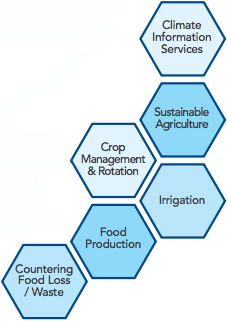 Our solution is designed to enhance agricultural productivity and conserve natural resources. Both contribute to climate adaptation and mitigation. Although climate change has global impacts on forests, agriculture and biodiversity, we recognize the need to develop tailored approaches that best address regional variations.
Our solution is designed to enhance agricultural productivity and conserve natural resources. Both contribute to climate adaptation and mitigation. Although climate change has global impacts on forests, agriculture and biodiversity, we recognize the need to develop tailored approaches that best address regional variations.
 Improve resilience of agricultural systems
Improve resilience of agricultural systems
Resilience means being able to recuperate from shocks and negative impacts – in this context, impacts related to climate change, such as severe storms and droughts. For smallholder farmers, these shocks can exhaust scarce resources of cash, seeds and livestock.
Our work with smallholders underscores the importance of diversifying production and income streams in order to reduce reliance on any one crop. To deliver the benefits of diversification, we provide farmers with weather data, selected inputs and training in improved agronomy practices, as well as assistance incorporating nutrition considerations into crop selection. Additionally, our work with women smallholders has improved household nutrition and health outcomes. Adding livestock husbandry contributes to improved nutrition and can provide an additional source of household income. We also identify ways to reduce food loss and generate off-farm income. Crop and income diversification increase resiliency.
 Strengthen natural resource management
Strengthen natural resource management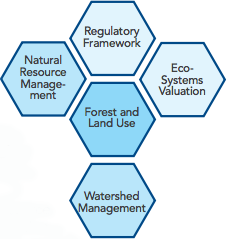
Governments must protect valuable natural resources while ensuring viable economic livelihoods for their citizens. We engage communities to develop land and resource allocation agreements; build capacity within communities to address conflicts; and add the knowledge and technologies
necessary for efficient water management, development of natural resource products and proper ecosystem valuation.
To support increases in production, farmers need a reliable and sufficient source of water. This often requires investments in water capture, storage and irrigation infrastructure. Newer, high-yielding varieties of cereal crops can double or even triple production, but typically require reliable access to water and nutrients. We help communities and smallholders secure the water access they need.
 Safeguard critical ecosystems
Safeguard critical ecosystems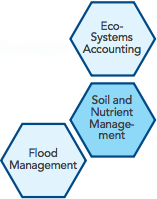
Forests, wetlands and grasslands are critical ecosystems that affect water and nutrient flows in watersheds. Winrock was an early innovator in ecosystems accounting and pay-for-performance systems that provide communities financial returns for the sustainable management of natural resources. Using sophisticated data collection technologies, we increase awareness of environmental services and the impacts of planned and unplanned land use changes. We provide governments with a range of tools to measure, map and monitor the impact of their development and conservation choices. We also help corporations measure emissions and meet sustainability pledges.
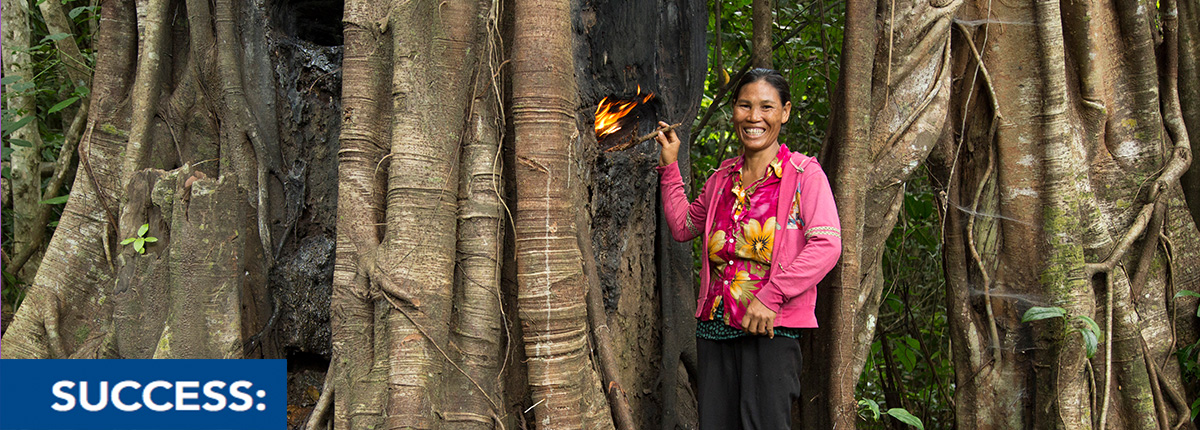
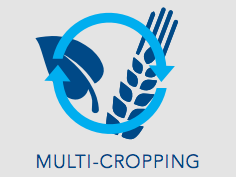 One effective strategy to promote resilience is known as multi-cropping. Winrock has helped smallholders diversify crops to increase their incomes, nutrition and adaptability to climate change — all of which contribute to household resilience. In South Asia, our work has supported aquaculture farmers to grow nutritious vegetables such as orange sweet potatoes, red amaranth and spinach on the banks of ponds. In sub-Saharan Africa, we have enabled poor households to augment their crop income with money earned selling natural resource products such as shea nuts, tamarind and moringa, with a focus on helping women adopt improved, time- saving processing methods.
One effective strategy to promote resilience is known as multi-cropping. Winrock has helped smallholders diversify crops to increase their incomes, nutrition and adaptability to climate change — all of which contribute to household resilience. In South Asia, our work has supported aquaculture farmers to grow nutritious vegetables such as orange sweet potatoes, red amaranth and spinach on the banks of ponds. In sub-Saharan Africa, we have enabled poor households to augment their crop income with money earned selling natural resource products such as shea nuts, tamarind and moringa, with a focus on helping women adopt improved, time- saving processing methods.
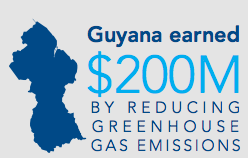 Reducing greenhouse gas emissions is one potential source of revenue to support improved natural resource management. Winrock helped the Government of Guyana assess the country’s historical greenhouse gas emissions from its forests and monitor ongoing emissions in support of its pioneering reducing emissions from deforestation and forest degradation (REDD+) programs. Norway committed to pay Guyana $5 for each ton of emissions it reduced, an agreement that has earned the nation over $200 million.
Reducing greenhouse gas emissions is one potential source of revenue to support improved natural resource management. Winrock helped the Government of Guyana assess the country’s historical greenhouse gas emissions from its forests and monitor ongoing emissions in support of its pioneering reducing emissions from deforestation and forest degradation (REDD+) programs. Norway committed to pay Guyana $5 for each ton of emissions it reduced, an agreement that has earned the nation over $200 million.
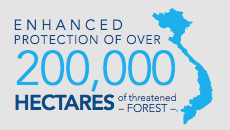 Vietnam provides another example of potential markets for ecosystem services. In Vietnam, Winrock sponsored a local research team to carry out a survey of downstream water users. The survey found that 90 percent of residents in Ho Chi Minh City would be willing to pay an average of 5 percent more for water if the additional funds would go directly to poor communities living in the Dong Nai watershed, which provides drinking water for the city. These findings helped lead the government to approve water services fees. The fees have provided 10,000 Dong Nai households an average annual payment of between $540 and $615, leading to enhanced protection of over 200,000 hectares of threatened forest.
Vietnam provides another example of potential markets for ecosystem services. In Vietnam, Winrock sponsored a local research team to carry out a survey of downstream water users. The survey found that 90 percent of residents in Ho Chi Minh City would be willing to pay an average of 5 percent more for water if the additional funds would go directly to poor communities living in the Dong Nai watershed, which provides drinking water for the city. These findings helped lead the government to approve water services fees. The fees have provided 10,000 Dong Nai households an average annual payment of between $540 and $615, leading to enhanced protection of over 200,000 hectares of threatened forest.
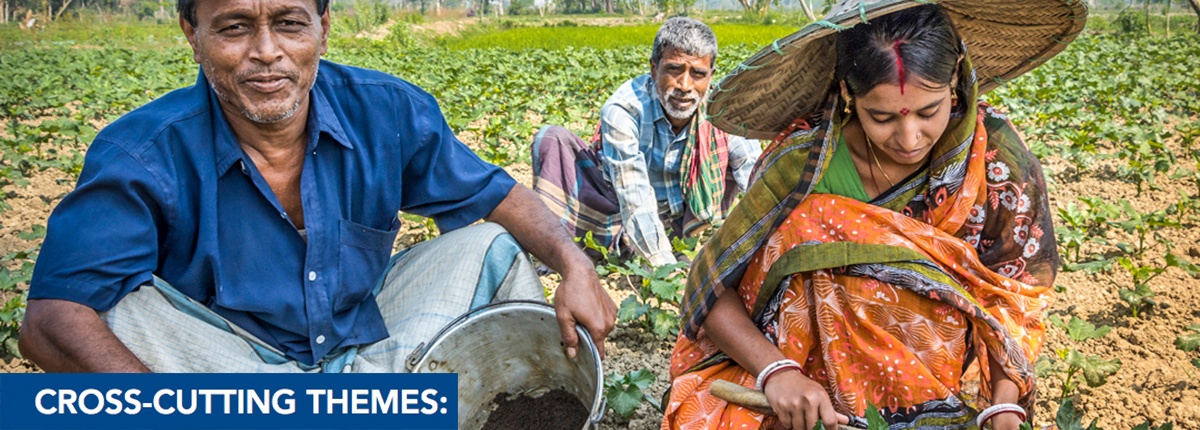
Winrock’s integrated solutions are rooted in the following principles:
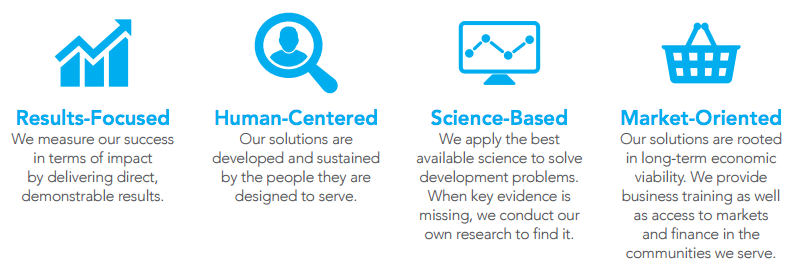
Winrock’s integrated solutions incorporate the following tools and processes:
